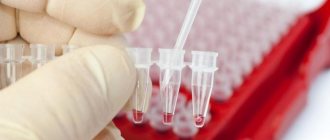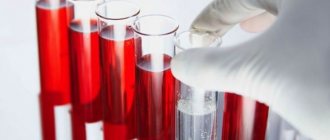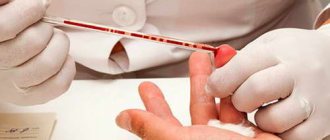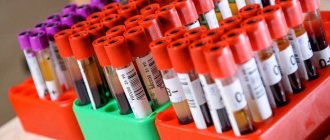Parathyroid hormone belongs to the group of active biological substances; it is synthesized by the parathyroid glands. This substance is involved in the regulation of calcium and phosphorus metabolism in the blood.
Based on the analysis data for parathyroid hormone, conclusions are drawn about the intensity of metabolic processes involving microelements such as calcium and phosphorus. The study helps to suspect diseases that occur against the background of hypoparathyroidism, in particular, impaired functioning of the kidneys and liver, pancreatitis, and vitamin D deficiency.
Parathyroid hormone - what is it?
Parathyroid hormone is a hormone of the parathyroid glands
(it would be more correct to say “parathyroid glands”, but many patients are already very accustomed to the term “parathyroid glands”, although it is not entirely correct from the point of view of word formation).
Parathyroid hormone production
produced by parathyroid cells in response to a decrease in the level of ionized calcium in the blood. On the surface of the cells of the parathyroid glands there are special receptors that are able to assess the concentration of ionized calcium in the blood and, in accordance with its level, produce parathyroid hormone in larger or smaller quantities.
Very often the term “ parathyroid hormone”
"(parathyroid hormone - from parathyroid hormone) is written incorrectly, since it can be difficult for a non-specialist to hear all the features of the correct spelling.
Often on the Internet you can come across terms such as “ parad hormone
”, “
parade hormone
” and even “
parade of hormones
”. The correct term, of course, is one - parathyroid hormone (written together and without a hyphen).
Parathyroid hormone is a polypeptide hormone
(i.e. consisting of amino acids). There are 84 amino acid residues in the parathyroid hormone molecule. Currently, the structure of parathyroid hormone has been completely deciphered by scientists. It was found that in the parathyroid hormone molecule, the first 34 amino acid residues are responsible for the biological activity, and the rest are responsible for the binding of the hormone to receptors and the stability of the molecule as a whole.
The main effect of parathyroid hormone is to increase the level of ionized calcium
in blood. This action is realized through three different effects.
Firstly, parathyroid hormone enhances the activation of vitamin D in the kidneys
, which leads to the formation of an important hormone-like substance, calcitriol, from vitamin D. Calcitriol stimulates the absorption of calcium in the intestine, which leads to an increased flow of calcium from food into the blood. A prerequisite for the implementation of this effect of parathyroid hormone is the presence of a sufficient amount of vitamin D in the body. Without sufficient supply of vitamin D in the blood, parathyroid hormone is not able to enhance the absorption of calcium in the intestine.
Secondly, parathyroid hormone enhances the reabsorption of calcium ions from primary urine
. This effect is realized at the level of the renal tubules.
Thirdly, parathyroid hormone enhances the activity of osteoclasts
– cells that destroy bone tissue. Osteoclasts, like bulldozers or excavators, begin to actively destroy bone beams and release the resulting calcium into the blood. As a result, the concentration of calcium in the blood increases, but the strength of bone tissue decreases, which increases the likelihood of fractures.
Parathyroid hormone is a very interesting hormone, since the effect of parathyroid hormone on the bone directly depends on the mode of its production
. Everything that we said above about the negative effect of parathyroid hormone on bone tissue is true only for cases when parathyroid hormone is constantly and continuously elevated. At the same time, periodic and short-term release of parathyroid hormone into the blood has a positive effect on bone tissue, leading to increased formation of bone beams and bone strengthening. Now this effect is used in the treatment of osteoporosis - even a medicinal analogue of parathyroid hormone (teriparatide) has been synthesized, the periodic administration of which into the body can increase the strength of bone tissue and reduce the likelihood of fractures.
Parathyroid hormone production
The production of parathyroid hormone is regulated by the level of ionized calcium
in blood. If calcium in the blood decreases, parathyroid hormone begins to be released more actively.
On the surface of the cells of the parathyroid glands there is a calcium-binding receptor, which is directly able to “sense” the concentration of calcium in the blood and regulate the rate at which parathyroid hormone is produced. This is the only receptor currently known to science that is “controlled” not by peptides or hormones, but by the substance itself—or rather, by its ions. Be that as it may, parathyroid hormone is normally produced by the parathyroid glands only when the concentration of calcium in the blood decreases.
Reasons for false results
A variety of factors can influence the result of the analysis:
- First of all, the level of the hormone changes during pregnancy and lactation.
- The obtained data can be changed if blood is collected and stored incorrectly.
- Eating large amounts of foods containing calcium may cause changes in levels.
- Parathyroid hormone levels are increased by diuretics, phosphates, rifampicin, lithium, steroids, isoniazid, and anticonvulsants.
- Parathyrine in the blood decreases after taking propranolol and cimetidine.
- In Burnett's disease, a false decrease in value occurs.
If a false result is received, the doctor prescribes a repeat blood donation.
Parathyroid hormone and calcium
There are two “friends” in the body, two substances that are inextricably linked - parathyroid hormone, calcium
.
At the same time, there is a relationship between them, which in endocrinology is described as “double feedback”. They sort of regulate each other. When the level of calcium in the blood decreases, parathyroid hormone begins to be released more strongly, as a result of which calcium in the blood increases and acts on the cells of the parathyroid glands through the receptor, causing them to stop releasing parathyroid hormone. After the release of parathyroid hormone ceases, calcium begins to gradually decrease until it reaches a level at which the cells of the parathyroid glands are activated with the release of parathyroid hormone - and the cycle repeats. Calcium is the main thing that parathyroid hormone influences, and at the same time parathyroid hormone is one of the most important substances that calcium influences
.
Parathyroid hormone and calcitonin
Unlike substances such as calcium, parathyroid hormone and calcitonin are “enemies”, antagonists
.
Parathyroid hormone aims to increase the level of calcium in the blood, and calcitonin aims to reduce it. Parathyroid hormone stimulates the destruction of bone beams with a prolonged increase, and calcitonin, on the contrary, causes the formation of new bone tissue and thereby strengthens the bone. The relationships between hormones, if you dig deep, are even deeper - for example, in some hereditary syndromes (multiple endocrine neoplasia syndrome, MEN), tumors simultaneously develop that produce both hormones - parathyroid hormone, calcitonin. Therefore, when examining for elevated parathyroid hormone, calcitonin is required
.
Causes and mechanisms of violations
If the release of parathyroid hormone is impaired, the body's phosphorus-calcium metabolism suffers, as calcium is lost by the kidneys, its absorption by the intestines is impaired, and it is washed out of the bones.
With an excess of parathyroid hormone, bone tissue formation slows down, while old bone beams are actively resorbed, which leads to softening of the bones (osteoporosis). The density of bones and their strength decreases, which threatens frequent fractures, while the level of calcium in the blood will be increased, since calcium is washed into the plasma under the influence of the hormone.
The kidneys suffer due to an increase in phosphorus salts in them, there is a tendency to stone formation, and ulceration occurs in the intestines and stomach due to vascular calcification and circulatory disorders.
Vitamin D and parathyroid hormone
Vitamin D and parathyroid hormone are substances whose effects are similar and largely depend on each other. Both substances - vitamin D and parathyroid hormone - their main effect is to increase blood calcium levels
. As is the case with calcium, parathyroid hormone and vitamin D can influence each other. This effect is very interesting and is implemented in general terms like this. When the level of calcium in the blood decreases, the cells of the parathyroid glands begin to actively produce parathyroid hormone, which enhances the hydroxylation of vitamin D in the kidneys and the formation of calcitriol, the active form of vitamin D, which, due to the strength of its action, can be confidently recognized as a hormone. Calcitriol, on the one hand, enhances the release of a special transport protein in the intestinal wall - calmodulin, which “drags” calcium from the intestinal lumen into the blood, and on the other hand, it directly acts on a special receptor on the surface of the cells of the parathyroid glands (it is called the vitamin receptor D or VDR, vitamin D receptor). Activation of the vitamin D receptor leads to suppression of the proliferation of parathyroid gland cells, i.e. indirectly acts to reduce parathyroid hormone levels.
It is important to understand that a decrease in the intake of vitamin D into the human body leads to a “disinhibition” of the division of cells of the parathyroid glands and at the same time to stimulation of the production of parathyroid hormone by these cells. This occurs when there is little sun exposure to the skin, since vitamin D is produced in human skin. The second cause of vitamin D deficiency is insufficient intake of vitamin D from food. Low vitamin D in the blood leads to a low intake of calcium into the blood, which activates the production of parathyroid hormone by the cells of the parathyroid glands.
Vitamin D deficiency has been proven to increase the incidence of benign tumors
– adenomas of the parathyroid glands (probably due to the elimination of the inhibitory effect of vitamin D on the division of cells of the parathyroid glands due to its deficiency).
The second common situation with which patients come to the North-Western Endocrinology Center is the so-called secondary hyperparathyroidism, i.e. a condition in which parathyroid hormone is elevated in the blood, but calcium is normal
. The detection of normal or reduced calcium simultaneously with an increase in parathyroid hormone levels usually indicates a low level of vitamin D in the blood. You can, of course, conduct a blood test for vitamin D, but you can do it differently - prescribe vitamin D and calcium supplements to the patient, and after 1-2 months, repeat the blood test for parathyroid hormone and ionized calcium. If a repeated analysis reveals a decrease or normalization of parathyroid hormone, and the calcium level is normal, this will indicate with a high degree of certainty that the patient simply needs to take calcium and vitamin D supplements longer. If a repeated blood test shows that parathyroid hormone is is still high, and calcium has increased above normal - this will indicate that the patient has primary hyperparathyroidism, a tumor of the parathyroid gland.
Parathyroid hormone norms
The amount of the hormone varies depending on age and gender:
Standards for men:
- up to 20-22 years - from 12 to 95 pg/ml
- from 23 to 70 children – from 9.5 to 75 pg/ml
- over 71 years old – 4.7 to 117 pg/ml
Norms for women:
- up to 20-22 years - from 12 to 95 pg/ml
- from 23 to 70 children – from 9.5 to 75 pg/ml
- over 71 years old – 4.7 to 117 pg/ml
During pregnancy, parathyroid hormone levels range from 9.5 to 75 pg/ml.
Blood test for parathyroid hormone
Analysis for parathyroid hormone
is one of the most important in the list of examinations prescribed for suspected calcium metabolism disorders, including the development of osteoporosis.
Blood for parathyroid hormone is usually donated simultaneously with an analysis for ionized calcium, phosphorus, calcitonin
, since such a block of studies allows the endocrinologist to most fully assess the metabolic state. It is also highly advisable to immediately perform densitometry - a study of bone tissue density, which shows the likelihood of developing bone fractures.
Parathyroid hormone - analysis
, the quality of which varies greatly between different laboratories. Currently, the most common methods of performing a blood test for parathyroid hormone are enzyme immunoassay (the so-called 2nd generation method) and immunochemiluminescence (3rd generation method).
Most laboratories analyze parathyroid hormone using a 2nd generation method
, since equipment and reagents for enzyme-linked immunosorbent assay (ELISA) are inexpensive, you can even use domestically produced reagents. At the same time, the use of the ELISA method leads to a decrease in the accuracy of the analysis of parathyroid hormone in the blood and an increase in error.
The specialized laboratory of the North-Western Center for Endocrinology uses a 3rd generation automatic immunochemiluminescent analyzer DiaSorin Liaison XL (Italy) to perform analysis for parathyroid hormone.
– a device with exceptionally high analytical accuracy. In the work of endocrinologists at our center, the accuracy of a test such as a blood test for parathyroid hormone is the main diagnostic component, so we take issues of research quality very seriously. The specialized laboratory of the center NEVER performs parathyroid hormone analysis using the 2nd generation method and NEVER uses either domestic or Chinese reagents - only reagents made in Italy by the DiaSorin company.
If you are deciding where to donate parathyroid hormone
, and are not sure what tests should be taken additionally -
do the following blood test: parathyroid hormone and calcium (ionized is very desirable), phosphorus, calcitonin
. If you also donate your daily urine test for calcium, that will be simply wonderful; any endocrinologist will appreciate your erudition in matters of taking tests.
In the laboratory of the Endocrinology Center, the analysis for ionized calcium is carried out using an automatic biochemical analyzer Olympus AU-680 (Japan) - a high-performance, high-precision automatic machine capable of conducting up to 680 biochemical tests per hour! Combined with the high accuracy of parathyroid hormone and calcitonin tests, an accurate calcium test will provide optimal diagnostic results.
Indications for analysis
If pathology of the parathyroid glands and parathyroid hormone metabolism disorders are suspected, a blood test is performed to determine the level of this hormone. Indications for the study:
- decrease or increase in the level of calcium in the blood plasma,
- frequent bone fractures,
- osteoporosis,
- sclerotic processes in the area of the vertebral bodies,
- cystic changes in the bones,
- suspicion of tumor processes in the parathyroid glands,
- urolithiasis with calcium phosphate stones.
Preparing for the study
For analysis, blood is taken from a vein in the morning, on an empty stomach; the last meal should be no later than eight hours before the test. Three days in advance, you should give up physical activity and alcohol consumption, and on the day of the study, stop smoking. Before taking the test, you need to sit quietly for half an hour.
Where to get parathyroid hormone
The specialized laboratory of the North-Western Endocrinology Center takes tests for parathyroid hormone and calcium, phosphorus and calcitonin
, as well as receiving other analyzes (more than 1000 studies) at the following addresses in St. Petersburg and Vyborg:
— Petrograd branch of the endocrinology center
– center of St. Petersburg, 200 meters to the left on foot from the Gorkovskaya metro station, Kronverksky Prospekt, building 31. Branch opening hours: 7.30-20.00, seven days a week. Phone: 498-10-30. There is parking for cars.
— Primorsky branch of the endocrinology center
– Primorsky district of St. Petersburg, 250 meters to the right from the Begovaya metro station. Branch address: st. Savushkina, house 124, building 1. Branch opening hours: 7.00-20.00, seven days a week. Phone: 565-11-12. There is parking for cars.
— Vyborg branches of the Endocrinology Center:
- Vyborg, st. Gagarina, 27A, tel., from 7.30 to 20.00, seven days a week. There is parking available for cars.;
- Vyborg, Pobedy Ave., 27A, tel. (81378) 36-306, from 7.30 to 20.00, seven days a week. There is parking for cars.
The branches of the endocrinology center provide everything for the comfort of patients who came to take parathyroid hormone, calcium and other tests
– no queues, comfortable treatment rooms with comfortable chairs and cartoons for a positive attitude, air conditioning and deep air purification systems, modern vacuum blood collection systems.
You can receive the results of a blood test for parathyroid hormone and other indicators by email
immediately after they are completed. In the vast majority of cases, tests are performed within 1 day (often the test for parathyroid hormone and calcium is ready in the evening of the day the patient came for the test).
You can find a complete list of laboratory branches in the Leningrad region (the cities of Luga, Gatchina, Kingisepp, Svetogorsk) here.
If you are not yet sure where to take parathyroid hormone in St. Petersburg or the Leningrad region
– contact the Northwestern Endocrinology Center. You will be confident in the quality of the research and conduct it with comfort. It is important that in the same center you can get a consultation with an endocrinologist who has significant experience in treating disorders of parathyroid hormone production.
Parathyroid hormone is normal
When you donate blood in a specialized modern laboratory and receive the result of a test for parathyroid hormone, the norm is indicated on the laboratory form
immediately after your individual result.
Parathyroid hormone levels can be expressed in two different units of measurement - pg/ml and pmol/l. Recalculation between them is possible using the following formula:
parathyroid hormone level in pmol/l x 9.8 = parathyroid hormone level in pg/ml
Parathyroid hormone is normal
, when it fits within the boundaries specified as reference limits (standards).
This indicator is not dependent on gender - if you take a parathyroid hormone test, the norm for women will not differ from the norm for men
.
Preparing for the study
To get an accurate test result for parathyroid hormone, it is recommended to follow the preparation rules:
- The analysis is done on an empty stomach. Doctors recommend that the patient take a break from eating for 8 hours.
- The material is given early in the morning, at which time the concentration of the hormone is minimal. The maximum content of biologically active substances of this type is observed around 14-16 hours.
- Five days before the examination, I stop taking medications and vitamins. The concentration of PTH under the influence of certain drugs may increase or decrease.
- The day before the analysis, you will have to exclude milk and dairy products, fish, and nuts from your diet.
- During this time, you should not drink alcoholic beverages.
- Before the analysis, you can drink water, but not coffee or strong tea.
- Twenty-four hours before the examination, reduce physical stress on the body as much as possible.
- Three hours before visiting the treatment room you will have to give up cigarettes.
A few days before donating blood, you cannot undergo fluorography or tomography. The same ban is imposed on physiotherapeutic treatment.
Parathyroid hormone is elevated
Increased parathyroid hormone
is one of the most common reasons for patients to visit an endocrinologist - and rightly so, since high parathyroid hormone in the blood always means the presence of a disease that needs to be treated.
An increase in parathyroid hormone is referred to as “hyperparathyroidism”
. High parahormone is the main symptom of hyperparathyroidism. There are two main variants of this condition: primary hyperparathyroidism and secondary hyperparathyroidism. Tertiary hyperparathyroidism is also identified, which occurs in patients with chronic renal failure receiving hemodialysis - but we will not consider it in this article.
Primary hyperparathyroidism is a condition when at the same time parathyroid hormone and calcium are elevated in the blood
. Additional symptoms of primary hyperparathyroidism are a decrease in blood phosphorus (not found in all cases) and an increase in the level of calcium in daily urine (also not in all cases). High parathyroid hormone in the blood in primary hyperparathyroidism is associated with the formation of a parathyroid adenoma - usually a benign tumor that produces parathyroid hormone uncontrollably. The increase in parathyroid hormone in the blood directly depends on the size of the adenoma - the larger it is, the higher the parathyroid hormone is detected. If a patient has primary hyperparathyroidism and parathyroid hormone is elevated - treatment is always surgical - removal of the adenoma gives excellent results, returning all components of phosphorus-calcium metabolism to normal limits.
When a patient has high parathyroid hormone, the causes of this condition may be associated with vitamin D deficiency (we talked about this earlier). If parathyroid hormone is increased in the blood, and calcium is normal or decreased
– most likely, we are talking about secondary hyperparathyroidism, associated with a low amount of vitamin D entering the body. Treatment of such an increase in parathyroid hormone is always carried out in a conservative way, taking vitamin D and calcium supplements.
It is very important, when understanding the reasons why parathyroid hormone is elevated, not to confuse secondary hyperparathyroidism with primary hyperparathyroidism - otherwise the patient will undergo an absolutely unnecessary surgical intervention, the results of which, of course, will not please either the doctor or the patient.
Deviations from the norm
An increase in parathyroid hormone levels indicates:
- primary or secondary hyperparathyroidism as a result of cancerous degeneration, rickets, Crohn's disease, colitis, renal failure or hypervitaminosis D,
- Solinger-Ellison syndrome (tumor in the pancreas).
A decrease in parathyroid hormone levels indicates:
- primary or secondary hypoparathyroidism due to magnesium deficiency, sarcoidosis, thyroid surgery, vitamin D deficiency,
- active process of bone destruction (osteolysis).
Elevated parathyroid hormone - how to cure, where to cure?
For an accurate diagnosis, all patients are recommended to contact specialized centers for endocrinology and endocrine surgery, such as the North-Western Center for Endocrinology in St. Petersburg, the Russian leader in the treatment of hyperparathyroidism.
In our center, we annually consult several thousand patients whom doctors (!) refer for surgery to remove a parathyroid adenoma, but in fact the patients only have a deficiency or insufficiency of vitamin D, which is easily eliminated by taking pills. True, there are also the opposite situations, when patients with large parathyroid adenomas come to us for surgery, for whom the diagnosis has not been established for several years, which simply leads to catastrophic consequences for the body. Every year, several patients with increased parathyroid hormone due to adenoma require resuscitation due to the threat of coma. There are situations when patients undergo surgery on the very first day, the adenoma is removed, and then a two to three month course of resuscitation and restorative treatment is required - that is how far the pathological process goes.
In the vast majority of cases, patients from other regions of Russia at the North-Western Endocrinology Center undergo surgical treatment free of charge, under the federal quota system or simply under a compulsory health insurance policy. Outpatient examinations are carried out for a fee, but their cost is rarely high.
So, if you have elevated parathyroid hormone, it is wiser to come for examination and treatment to a specialized endocrinology center
where you will receive qualified assistance.
Parathyroid hormone is low
The situation when parathyroid hormone is low
, occurs rarely in life. The main reason for a decrease in parathyroid hormone in the blood is a previous operation on the thyroid gland, during which the nearby small and not always clearly visible parathyroid glands were accidentally removed or deprived of blood supply.
Typically, when parathyroid hormone is low, symptoms
include numbness of the fingers and toes, the appearance of an unpleasant feeling of “goose bumps” on the skin, and the appearance of convulsive muscle contractions. The severity of these symptoms depends on the level of calcium in the blood - the lower they are, the worse the patient feels. In severe cases, generalized seizures may develop. If left untreated, the patient may die.
For a condition where parathyroid hormone is low, there is a special term - “hypoparathyroidism”. Many patients with a similar problem are trying to figure out how to increase parathyroid hormone
, however, whether an increase in parathyroid hormone will occur in the future or not after surgery usually depends only on how much injury was caused to the parathyroid glands. If restoration of the function of the parathyroid glands is possible, then it will certainly occur. However, during the entire time that parathyroid hormone is low, patients need to take vitamin D and calcium supplements - sometimes in quite large doses.
Functions of parathyroid hormone
Parathyroid hormone is produced in the area of the parathyroid glands, is a special protein molecule and takes an active part in the metabolism of calcium, and indirectly - phosphorus. The level of the hormone depends on the amount of calcium ions in the blood - the lower the calcium level, the more actively the parathyroid glands secrete this hormone. Its main function in the body is:
- reducing calcium loss in urine,
- increased excretion of phosphorus in urine,
- extraction of calcium and phosphorus from bone tissue into the blood in case of its deficiency,
- deposition of calcium in the bones when there is excess calcium in the blood.
The level of the hormone fluctuates throughout the day, which is associated with the physiological characteristics of calcium metabolism and human biorhythms; the maximum concentration of the hormone is reached at 3 o’clock in the afternoon, the minimum at 7 am.










